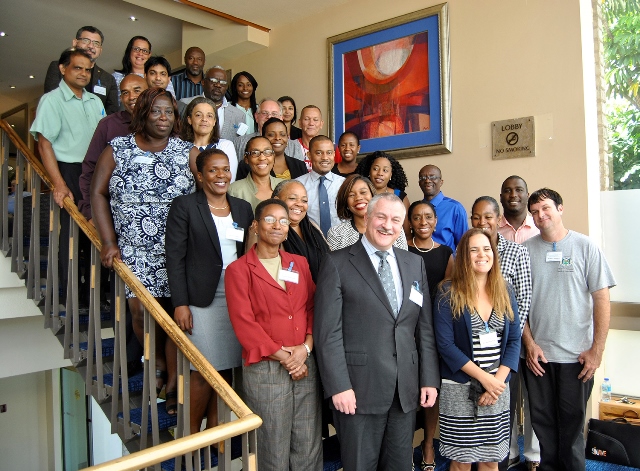
GREAT BAY, Sint Maarten (DCOMM) – Vector-borne diseases have become very prominent within the Caribbean Basin. Dengue has been around for years until Chikungunya was introduced in 2013 followed by Zika.
The Caribbean Region just held its first meeting of the Surveillance and Vector Control Working Groups of the Caribbean Vector-Borne Diseases Network (CariVecNet).
The Caribbean Public Health Agency (CARPHA), as coordinator of the Network, hosted twenty experts in vector control and vector-borne disease surveillance from ten CARPHA Member States.
Personnel from Institut Pasteur, Guadeloupe; Ross University School of Veterinary Medicine, Saint Kitts and Nevis and the Pan American Health Organization (PAHO) were also in attendance.
The meeting was funded by the U.S. Center for Disease Control and Prevention (CDC) Global Health Security Corporative Agreement.
The Sint Maarten delegation representatives were Maria Henry and Gerald Davelaar, Collective Prevention Services (CPS), a department within the Sint Maarten Ministry of Public Health, Social Development and Labour (Ministry VSA).
CPS reps said they were very pleased with this approach and look forward to receiving additional information on the way forward.
Delegates discussed the formation and operations of the Network and drafted a two-year work plan for both working groups.
The Network will act as an avenue for exchange of surveillance information on the circulating vector borne diseases, and collaboration on vector control and research topics such as insecticide resistance and community-based intervention.
Additionally, the Network will work on the standardization of operating procedures and training for the diagnosis, surveillance, prevention and control of vector-borne diseases in the Caribbean, with the expected long-term outcome being better prevention and control of the aforementioned.
A Caribbean Vector WhatsApp discussion group was created and implemented where all the participants at that workshop can communicate and discuss issues surrounding vector and its related development.
It is anticipated that the discussion group will expand with additional colleagues from the region. Also coming out of the meeting is the first task under the objective of standardization, a review of the CARPHA drafted Ovi-trap guidelines once all participants have reviewed and returned their comments to the project coordinator for the Ovi-trap guidelines. These comments will be submitted to CARPHA by the Chairperson of the group Teresa Leslie, from St. Eustatius.
CPS takes this opportunity to remind the community that there is one sure way of mitigating mosquito borne diseases, and that is removing mosquito breeding sites from within and surrounding your premises, and apply mosquito repellent to stop mosquitoes’ from feeding.
The meeting took place from March 13-14 in Trinidad & Tobago.
For more information about preventative measures related to mosquitoes, call CPS at 542-2078, 542-3003 or email surveillance@sintmaartengov.org




























